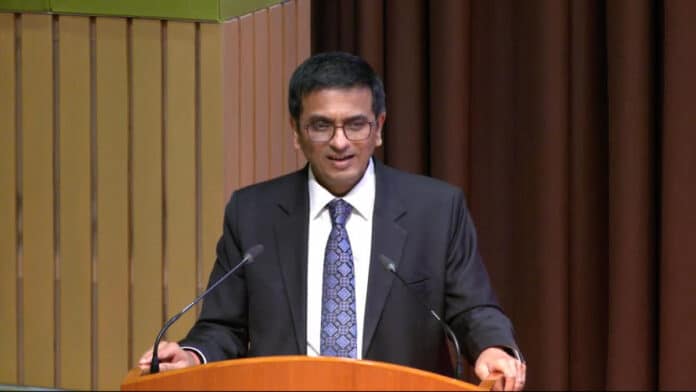Chief Justice of India DY Chandrachud pitched for the use of technology in arbitral proceedings on Thursday and said the arbitration centres in the country should adopt protocols for holding virtual hearings.
Speaking at the “Delhi Arbitration Weekend” organised by the Delhi International Arbitration Centre (DIAC) here, the CJI said the country’s arbitration space should foster gender diversity.
He said setbacks in any new system should be seen as an opportunity for growth rather than “sounding a death knell for adoption of technology”.
“I take this opportunity to encourage the DIAC to draft and adopt a protocol on virtual hearings, which is tailored to the Indian context. Indeed, every arbitration centre in India would do well to adopt protocols in this regard because the parties to arbitration would be the biggest beneficiaries,” the CJI said.
The COVID-19 pandemic acted as a “catalyst” for adoption of technologies by the legal system and adoption of guidelines for virtual hearings by arbitral institutions, he said, adding that this would ensure certainty and that the process remains efficient.
The CJI was the chief guest at the event held in the Delhi High Court. Current and former Supreme Court and high court judges, members of the Bar and other dignitaries were present on the occasion.
The CJI said arbitration has an important role to play in fostering the rule of law and asserted that he is truly committed to developing India as an arbitration-friendly jurisdiction.
In his keynote address, CJI Chandrachud said while technology has several benefits, such as lowering the costs of legal proceedings when held virtually, it is “fallible” and issues, such as how secure an online platform is, “merit serious consideration”.
He also said while retired judges are “doing amazing work” as arbitrators, opportunities must be given to young arbitrators and if the Indian legal system has to move away from being an “old boys’ club”, the “arbitration space can add heft to the mission to provide equal opportunity to men, to women and to them”.
“The arbitration space in India can do well to foster diversity in terms of source and experience. The experiential learning that a gender-diverse arbitration pool would bring to the process must also be emphasised,” the CJI said.
He also stressed the need to train judges and lawyers in the practice of arbitration and spoke on the importance of the proceedings going paperless.
Two cases in the Supreme court, which were to be adjudicated by a Constitution bench, were conducted completely without paper and Odisha even has paperless courts, the CJI pointed out.
“There is a long-standing perception that courts are behind the curve when it comes to modernising their processes…. This is slowly but surely changing. Soon, the courts will be light years ahead in terms of technology and domestic arbitration may be lagging behind,” the CJI said.
He spoke on the importance of “transcriptions” of arbitral proceedings and said arbitration should also reach smaller businesses by being more affordable and interim reliefs should be readily available to the parties.




